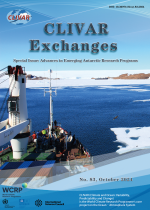The 15th Session of CLIVAR/IOC-GOOS Indian Ocean Region Panel took place in Port Elizabeth, South Africa, on 14-15 March 2019, in conjunction with other Indian Ocean Science meetings, including the 3rd Meeting of the second International Indian Ocean Expedition (IIOE-2) Steering Committee, the 9th...
News
Introduction
The Advanced School and Workshop will take place on August 19-24, 2019 at São Paulo, Brazil, it will bring together scientists and students for presenting and discussing the progress in research on the American monsoons and...
The organizers would like to invite you to contribute to a Special Collection titled “The Earth’s energy imbalance and its implications”, that will appear in the Journal of Climate and all other journals of the American Meteorological Society. Articles for the special collection should consider observations and/or modelling of all aspects of Earth’s energy imbalance and the resultant heating...
The 24th Session of the CLIVAR Scientific Steering Group was held at the Consortium for Ocean Leadership in Washington, DC., USA from 27th to 29th November 2018. The meeting was hosted by US CLIVAR and brought together the members of the Scientific Steering Group (SSG), the WCRP Joint Scientific Committee (JSC), the Executive Committee of the US CLIVAR Scientific Steering Committee (SSC...
Ocean circulation models have evolved a lot in the past ten years.Recently, members from the CLIVAR Ocean Model Development Panel (OMDP) and collaborators summarized the new developments in ocean modeling since a similar OMDP review from 2010. Their review summarized the challenges and prospects at the forefront of present work in ocean modeling. This article can be found in...
The UNESCO/IOC Regional Training and Research Center on Ocean Dynamics and Climate (ODC) will have its ninth training course on Climate Dynamics and Air-sea Interactions in Qingdao, China, 17-28 June 2019.
This Training Course is designed to develop the capacity of member states in the Western Pacific (suitable candidates from outside the region will also be welcome), who are involved...
Figure: A schematic illustration of pantropical feedbacks affecting ENSO. The black loop represents internal Pacific fast positive feedbacks (short arrows) and delayed negative feedbacks (long arrows). Interbasin feedbacks include Pacific feedbacks onto the Atlantic and Indian Oceans (blue arrows), delayed negative feedbacks of the Atlantic and Indian...
World Climate Research Programme (WCRP) recently announced that the WCRP Joint Scientific Committee (JSC) had elected Professor Detlef Stammer as its Chair and Dr Helen Cleugh as its Vice-chair for two years.
Detlef Stammer is a Professor at the Institute of Oceanography and the Director of the Center for Earth System Sciences and Sustainability (CEN), both at the University of Hamburg...
Driven by increases in computing power, the treatment of small-scale physical processes in atmospheric models is at an exciting juncture. Some recent approaches (e.g., higher-order closure) are being implemented operationally, and others (e.g., machine learning) are being explored in earnest. To discuss these alternatives and future possibilities, the National Science...
Dr. Beatriz Balino is the new science coordinator of the WCRP Coordination Office of Regional Activities (CORA) hosted at the Bjerknes Centre for Climate Research (BCCR) in Bergen, Norway. Before joining WCRP Beatriz was the national coordinator of the Norwegian Marine University Consortium (NMU) an institutional cooperation agreement to foster cooperation in research, education and...
Since 2010, the BNP Paribas Foundation has been supporting research on climate change through its Climate Initiative program, which has now enabled 18 international research teams to study the climate, with a total budget of 12 million euros. In addition, awareness on climate change has been raised among 340,000 people, through conferences,...
As part of the decadal conference series, OceanObs’19 will galvanize ocean observing communities to improve coordination of regional and national efforts to better observe the global ocean, to better respond to the joint scientific and societal needs of a fit-for-purpose ocean observing system, and maximize the overall benefit of more integrated observing. Each conference of the OceanObs...
Registration for TU Delft Summer School on "Sea Level Change: observations, processes and modelling”
The first CLIVAR-FIO Summer School on “Past, Present and Future Sea Level Changes” was organized in Qingdao, China, from June 25 to 30, 2018, back to back with the eighth UNESCO/IOC-ODC Training Course on Ocean Forecast System, held during 2-7 July 2018. The objective of the 2018 CLIVAR Summer School was to provide...
























